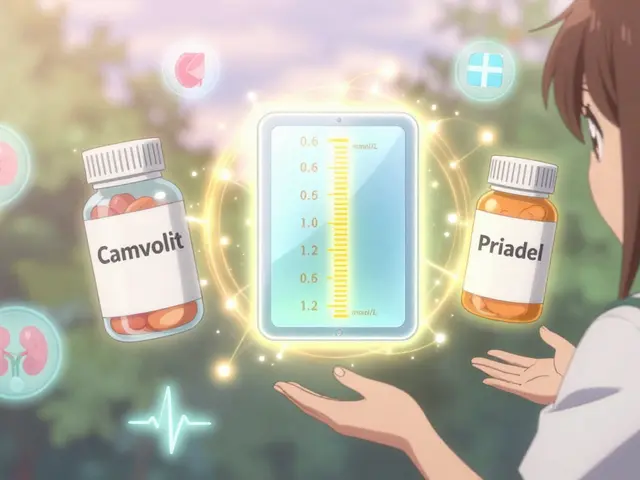Brain health: meds, supplements, and everyday steps that help
Want clearer thinking, steadier mood, or fewer medication surprises? This tag collects straightforward posts about drugs, supplements, and small habit changes that really affect your brain. You’ll find guides on antidepressants, epilepsy meds, safety tips for buying prescriptions, and supplements with real evidence behind them.
Medications that change how you feel and think
Antidepressants like Celexa (citalopram), Paroxetine, Wellbutrin SR, and Duloxetine can lift mood but also bring side effects. Read the article on Celexa to learn typical side effects and what to watch for during the first weeks. If one drug causes weight gain, sexual side effects, or sleep problems, the Paroxetine and Wellbutrin alternatives posts list options and trade-offs you can discuss with your prescriber.
Epilepsy drugs affect cognition differently. Oxcarbazepine helps control seizures but can cause dizziness or concentration changes for some people. If you buy epilepsy meds online, follow the safety checklist in our Oxcarbazepine guide: use a licensed pharmacy, keep prescriptions current, and verify shipping and storage conditions.
Some drugs used for other conditions still impact the brain. For example, Anastrozole can change metabolism and energy levels. If a medication alters your sleep, appetite, or thinking, track symptoms for a week and bring the notes to your clinician—specific examples make adjustments easier.
Supplements, diet, and simple habits that support cognition
Not every supplement is worth the hype, but a few show promise. Calanus oil offers a unique omega-3 mix that may support brain function like fish oil. Calcium D-Glucarate helps the body's detox pathways, which can indirectly affect hormone balance and mood. Always check product quality and doses—look for third-party testing and clear ingredient lists.
Herbs like tansy have risks as well as benefits; read our tansy safety post before trying them and never mix herbs with prescription meds without checking with a pharmacist. Small steps matter: consistent sleep, daily movement, and cutting back on heavy alcohol use give more reliable brain benefits than many trendy supplements.
Practical day-one actions: 1) Keep a single up-to-date medication list. 2) Note new symptoms for 7–14 days after a med change. 3) Ask your doctor about drug interactions and alternative treatments if side effects reduce your quality of life. 4) Use licensed pharmacies and keep receipts when ordering online.
If you're curious about a specific drug or supplement on this site, click the linked articles for detailed dosing, safety notes, and what real users report. Treat brain health as a mix of smart medication choices, safe sourcing, and steady daily habits—those three together make the biggest difference.
Boost Multitasking and Cognitive Flexibility with Galantamine
Explore how galantamine, a brain‑boosting drug, can improve multitasking and cognitive flexibility, backed by studies, dosage tips, safety info, and practical strategies.
Alzheimer's Disease and Stroke: The Hidden Link You Should Know
Discover the surprising connection between Alzheimer-type dementia and stroke, how these conditions overlap, and what it means for your brain health. This detailed guide unpacks the science, shares real stats, and gives genuinely helpful tips for protecting your memory and mental sharpness. Learn how lifestyle and medical choices can influence both dementia and stroke risks. Get a clear picture of prevention strategies and emerging research. No jargon—just well-explained, actionable insights anyone can use.
About
Health and Wellness
Latest Posts


Cyclosporine vs Other Immunosuppressants: Full Comparison Guide
By Marcel Kornblum Oct 18, 2025

How to Confirm Allergies and Interactions at Medication Pickup: A Step-by-Step Guide for Patients and Pharmacists
By Marcel Kornblum Jan 8, 2026

Why Storax is the Ultimate Game-Changer in Dietary Supplements
By Marcel Kornblum May 20, 2023


